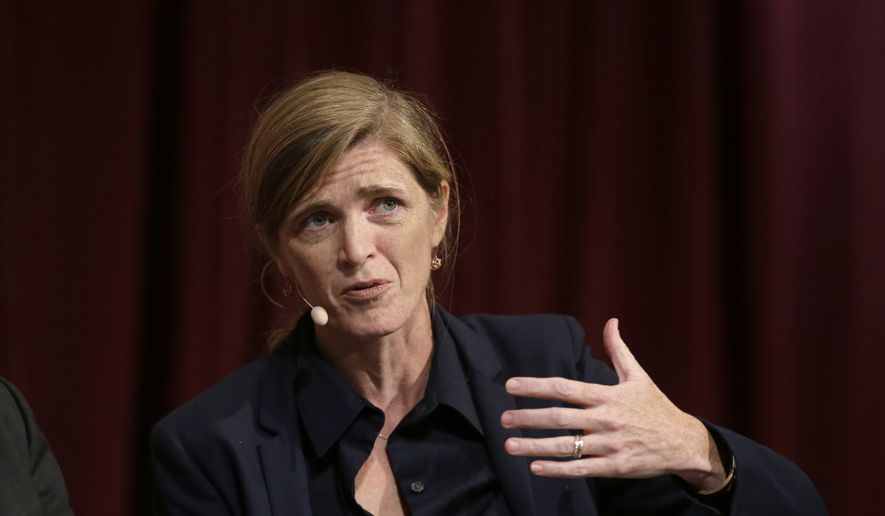President-elect Joseph R. Biden on Wednesday named Samantha Power, the U.S. ambassador to the United Nations during the Obama administration, as his pick to lead the U.S. Agency for International Development.
Mr. Biden also elevated the position to be in the National Security Council.
“As USAID administrator, Ambassador Power will be a powerful force for lifting up the vulnerable, ushering in a new era of human progress and development, and advancing American interests globally,” Mr. Biden said.
Before she served as U.N. ambassador from 2013-2017, Ms. Power was on the NSC staff from 2009-2013 as special assistant to the president and senior director for multilateral affairs and human rights.
“As a journalist, activist and diplomat, I’ve seen the world-changing impact of USAID,” she said in a tweet. “At this critical moment, I feel immensely fortunate to have the chance to serve again, working with the incredible USAID team to confront COVID-19, climate change, humanitarian crises, & more.”
Ms. Power had been critical of Hillary Clinton, the former secretary of state and 2016 Democratic presidential nominee, in the 2008 Democratic primaries. She famously called Mrs. Clinton a “monster” in an interview with a Scottish newspaper.
As such, she was a controversial choice for former President Obama to appoint to the NSC. But she overcame differences with Mrs. Clinton’s team and replaced Susan Rice as U.S. envoy to the U.N. when Mr. Obama named Ms. Rice his national security adviser after winning reelection in 2012.
Mr. Biden tapped Ms. Rice to head the White House Domestic Policy Council in the incoming administration.
Ms. Power was one of several high-ranking members of the Obama administration who apparently put in “unmasking” requests and may have learned Michael Flynn’s identity during the presidential transition period in 2016-2017 in response to a request.
She told the House Intelligence Committee that she had no recollection of making a request connected to Mr. Flynn, President Trump’s former national security adviser, and said she has never leaked classified or unclassified information.
The identities of U.S. citizens picked up during surveillance of foreign officials are required to be hidden or “masked,” and only high-ranking officials can request the names.
Mr. Flynn pleaded guilty to lying to the FBI about his contacts with Russian officials during the presidential transition period before Mr. Trump took office. He was pardoned by Mr. Trump in November.
Mr. Biden also announced several other members set to be on the incoming National Security Council.
He named Anne Neuberger, the National Security Agency’s director of cybersecurity, to a new position as deputy national security adviser for cyber and emerging technology.
Mr. Biden has said he will likely respond to the recent hack of the federal government and major corporations, which U.S. intelligence has blamed on Russia.
He named Elizabeth Sherwood-Randall as homeland security adviser and deputy national security adviser. Ms. Sherwood-Randall is a professor and former deputy secretary at the U.S. Department of Energy.
Mr. Biden also named Russ Travers, a former acting director of the National Counterterrorism Center, as deputy homeland security adviser.
• This article is based in part on wire-service reports.
• David Sherfinski can be reached at dsherfinski@washingtontimes.com.




Please read our comment policy before commenting.